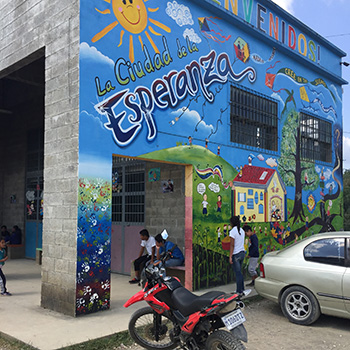Guatemalan Baby Shower Builds Self-Sustaining Care in Cobán
Nine reasons to attend the March 19 fundraiser and provide support
A group of Regis students will be in Guatemala from May 29 to June 5 assisting local healthcare workers and providing healthcare education in the town of Cobán. The project, led by Regis alumna Lauri Pramuk, M.D., and a team of healthcare providers, empowers Regis students to serve and learn from marginalized communities.
For the first time since March 2020, when our student team left Guatemala one day before the COVID-19 pandemic shuttered much of the world, 14 Regis students in pre-healthcare areas of study will run a primary care clinic in Cobán. Students will have the opportunity to rotate through triage and to shadow physicians. The group also will provide eyeglasses to townspeople and a year’s worth of pharmacy supplies to a local clinic.
A Guatemalan Baby Shower information session and fundraiser at 7:30 p.m., Saturday, March 19, will provide the Regis community with an opportunity to give supplies and monetary donations for the project. The baby shower will begin in front of the Student Center with the dedication of an alfombra, and then progress to St. John Francis Regis Chapel for the remainder of the fundraiser.
You may purchase needed items on Amazon. Here are 9 reasons to attend:
1. The Guatemalan government does not recognize some socio-economic groups in Cobán, which means many do not have legal rights or access to healthcare and education.
Largely composed of indigenous Mayans, many residents of Cobán are so low in the local caste system that they are essentially forgotten, Pramuk said. “Their kids couldn’t go to school, they couldn’t get health services. They were basically just cast aside.”
2. Some in Cobán — including single mothers — survive by scavenging and selling items from the town dump.
“Cobán is probably the most impoverished community that I’ve been in in Guatemala, and that’s saying a lot,” Pramuk said. “[Some] literally live in the dump.”
3. The team’s goal is not to drop into Cobán as “saviors” but to create a long-term partnership aimed at self-sufficiency in healthcare.
“We call it Santa Claus medicine — [groups] just drop in and do a bunch of stuff and think they’re doing good. It’s that white savior mentality,” Pramuk says. “That’s not going to change anybody’s life in the long run. We focus mostly on prevention and education, and partnering long-term with the community until they can become self-sufficient. We’re really trying to build capacity within that community to be able to take care of themselves.”
4. Pramuk and her team have a track record of success helping Guatemalans toward self-sufficiency in healthcare.
Years ago, Pramuk and her leadership team partnered with students from Xavier University in Cincinnati to become the first physicians to enter the Guatemalan community of Patanatic. After six years of a fruitful partnership, Pramuk said, there were leaders and health systems in place that helped Patanatic become virtually independent in meeting its healthcare needs.
5. The team partners with an innovative Guatemalan company called Ecofiltro that provides low-cost and life-changing water filters to Cobán.
“If you’re not drinking clean water, you’re not going to have health, especially in the pediatric population … [mothers] see how much of a difference [it makes], especially in their kids’ health, when the diarrhea goes away and stays away, and kids can actually eat and gain weight,” Pramuk said.
6. The March 19 fundraiser will help the group provide the essentials that young mothers in Cobán desperately need.
Many mothers — some raising multiple young children by themselves — don’t have any of the basic supplies provided in Regis’ baby kits, such as cloth diapers, Vitamin D drops, infant Tylenol and thermometers.
7. Giving Regis students this service opportunity in their early 20s is the best way to encourage lifelong habits of service.
“There’s an African proverb [that says], ‘Bend the tree while it is young,’ Pramuk said. “I think that’s exactly why this trip needs to happen. When people are in their early 20s, their brain development is still in a way that if you have an experience like this, the whole rest of your life you’re going to want to have experiences like this. It’s really going to change the trajectory of your medical career."
8. The trip creates space for students and providers of diverse faith backgrounds and gives students the opportunity to learn about faith traditions in Christianity, Islam, Judaism and more.
The Rev. Kevin Burke, S.J., vice president for mission at Regis University, will serve as the trip’s interfaith leader this year and will lead the group through the Jesuit examen throughout the trip. This year the team will also celebrate Shabbat dinner in Guatemala and watch a healing ceremony performed by a Mayan priestess.
9. This experience offers a way for Regis students to gain the perspective that can only come through intercultural connection.
“We hear about Guatemala on our TV screens, through our news feeds, and at the border — all the Guatemalans coming [to the United States],” said Chris Pramuk, Lauri Pramuk’s husband and Regis’ Chair of Ignatian Thought and Imagination. “But this trip gives students a glimpse of the reality behind that, on the other side.”
Regis sent a team of alumni in July 2021, so the upcoming trip will be the third Regis sponsored visit to Cobán, with many more to come. See photos of a previous trip to Cobán made by Pramuk and a team of students from Xavier University.
